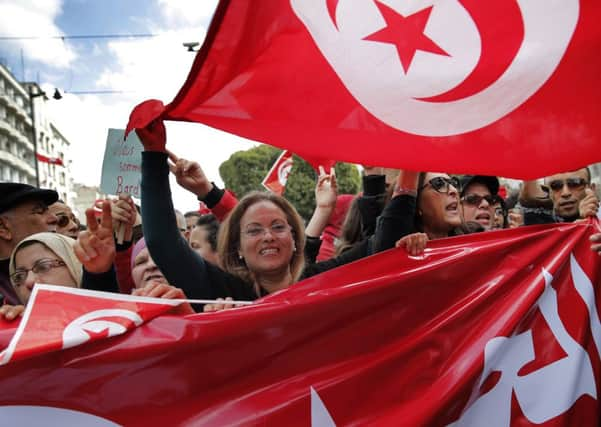Tunisia museum gunmen were trained in Libya


Rafik Chelli, the interior ministry’s security chief, said the attackers had slipped out of Tunisia in December and received weapons training in Libya before returning home. He added that authorities did not have details about where or with which group they had trained.
Wednesday’s attack at the National Bardo Museum killed 21 people, 17 of them tourists from cruise ships. The two gunmen were killed in a firefight.
Advertisement
Hide AdAdvertisement
Hide AdThe attack of such magnitude in Tunisia – the only country to emerge from the Arab Spring uprisings with a functioning democracy – raised concern about the spread of extremism to the rest of North Africa.
The Islamic State (IS) group, based in Iraq and Syria, has claimed responsibility. Several well-armed groups in Libya have pledged their allegiance to IS.
Tunisian health minister Samar Samoud yesterday confirmed that the latest tally of victims includes four Italians, three Japanese and three French, two Spanish and two Colombians, as well as one citizen each from Britain, Poland and Belgium.
The nationalities of three victims remain unconfirmed, Mr Samoud said.
French interior minister Bernard Cazeneuve was travelling to Tunis on a pre-scheduled visit yesterday coinciding with the country’s Independence Day holiday.
Police have arrested five people described as directly tied to the two gunmen as well as four others in central Tunisia said to be supporters of their cell.
On Thursday, Tunisians stepped around trails of blood and broken glass outside the museum to rally in solidarity with the 21 victims and with the country’s fledgling democracy. Marchers carried signs saying, “No to terrorism,” and “Tunisia is bloodied but still standing.”
In claiming responsibility for the attack, IS issued a statement and audio on jihadi websites applauding the dead gunmen as “knights” for their “blessed invasion of one of the dens of infidels and vice in Muslim Tunisia.”
Advertisement
Hide AdAdvertisement
Hide AdAnalysts cautioned against seeing every such attack as evidence of a well-organised, centrally controlled entity spanning the Middle East, saying instead that small groups could merely be taking inspiration from the high-profile militant group.
“I think (IS) is probably taking credit for something it may not have played a role in,” said Geoff Porter, a security analyst for North Africa.
Confronted with high unemployment, young Tunisians have disproportionately gone abroad to fight with extremist groups in Libya, Syria and Iraq, including some affiliated with IS. Upon their return home, some may have decided to carry out attacks on their own.
Tunisian authorities estimated that of the 3,000 young people who left to fight with radical groups, 500 have returned.